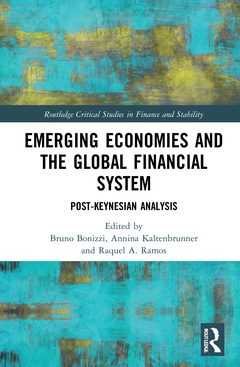Emerging Economies and the Global Financial System Post-Keynesian Analysis Routledge Critical Studies in Finance and Stability Series
Coordonnateurs : Bonizzi Bruno, Kaltenbrunner Annina, A. Ramos Raquel

This book provides a comprehensive overview of the financial integration of emerging economies through an in-depth analysis of the international monetary system, how it impacts capital flows and exchange rates, and its implications for policy making.
The financial integration of emerging economies has been a remarkable development of the past two decades. The growth of cross-border transactions and asset ownership, not least through the accumulation of foreign exchange reserves, has put many of these countries in a more prominent, if still peripheral, position within the global financial system. This has not been a smooth process, as integration has been marked by cyclical waves of capital flows, with financial and currency instability often accompanying the acute phases of these cycles. While conventional economic theory traditionally sees financial integration as a positive development, Post-Keynesian economists, working in the tradition of Keynes, Minsky and Kalecki, have long taken a more sceptical viewpoint. By centring the analysis of financial dynamics on concepts as liquidity, uncertainty, balance-sheet structures and institutions, Post-Keynesian theory highlights the intrinsic character of shocks imposed by financial integration upon emerging economies, and their implications for economic growth and distribution. This book demonstrates that these analyses can be fruitfully used to gain a better understanding of financial (in)stability and economic development in emerging economies as they integrate into the global financial system.
This work provides key reading for students and scholars of economics, political economy and finance that are interested in the financial integration of emerging economies, and how the heterodox tradition of Post-Keynesian economics contributes to its analysis.
Part I. Introduction and Background 1. Introduction 2. Two Post-Keynesian approaches to international finance: the compensation thesis and the cambist view 3. Trade versus capital flows: the key implicit and methodological differences between the neoclassical and the Post Keynesian approaches to exchange rate determination PART II. Minsky, balance sheets and cycles 4. A Minskyan framework for the analysis of financial flows to emerging economies 5. Post Keynesian and structuralist approaches to boom-bust cycles in emerging economies 6. Cost competitiveness and asset prices as determinants of the current account in emerging economies 7. Space in Post Keynesian monetary economics: an exploration of the literature PART III. Currency Hierarchy 8. Evolving international monetary and financial architecture and the development challenge: a liquidity preference theoretical perspective 9. International money, privileges and underdevelopment 10. The Post Keynesian View on Exchange Rates: towards the consolidation of the different contributions in the ABM and SFC frameworks 11. A Post Keynesian framework for real exchange rate determination: an overview Part IV. Current Account and Growth 12. The Kaleckian theory of exchange rates 13. Financial liberalisation, exchange rate dynamics and the financial Dutch disease in developing and emerging economies 14. Global financial flows in Kaleckian models of growth and distribution: a survey Part V. Policy Implications 15. Implications of Modern Money Theory on Development Finance 16. Monetary sovereignty in the Post Keynesian perspective: in the search of a concept 17. Dealing with global financial asymmetry: Contributions of Regional Monetary Cooperation Between Emerging Markets and Developing Countries 18. De-regulation of Finance in China and India: a Post Keynesian Analysis
Bruno Bonizzi is a Senior Lecturer in Finance at the University of Hertfordshire, Business School, UK.
Annina Kaltenbrunner is Associate Professor in the Economics of Globalisation and the International Economy at Leeds University Business School, UK.
Raquel A. Ramos is a Research Associate at the Centre d’Économie de l’Université Paris Nord, France.
Date de parution : 01-2023
15.6x23.4 cm
Date de parution : 05-2021
15.6x23.4 cm
Thème d’Emerging Economies and the Global Financial System :
Mots-clés :
Post Keynesian; uncertainty; Liquidity Premium; balance sheets; Nominal Exchange Rates; exchange rates; Low Liquidity Premiums; liquidity; Liquidity Preference; Post-Keynesian economics; Exchange Rate Dynamics; capital flows; RER; financial integration; Currency Hierarchy; financial instability; Exchange Rate; emerging markets; Exchange Rate Determination; economics; Covered Interest Parity; Political economy; Regional Monetary Cooperation; Economic growth; Post Keynesian Theory; Financial system; Post Keynesian Literature; Post-Keynesian theory; SFC Model; Economic distribution; Exchange Rate Appreciation; Financial Instability Hypothesis; Constrained Growth Models; Gdp Ratio; Post Keynesian Economics; Pk Scholar; Monetary Production Economies; Balance Sheet Effects; RER Determination; Vice Versa



